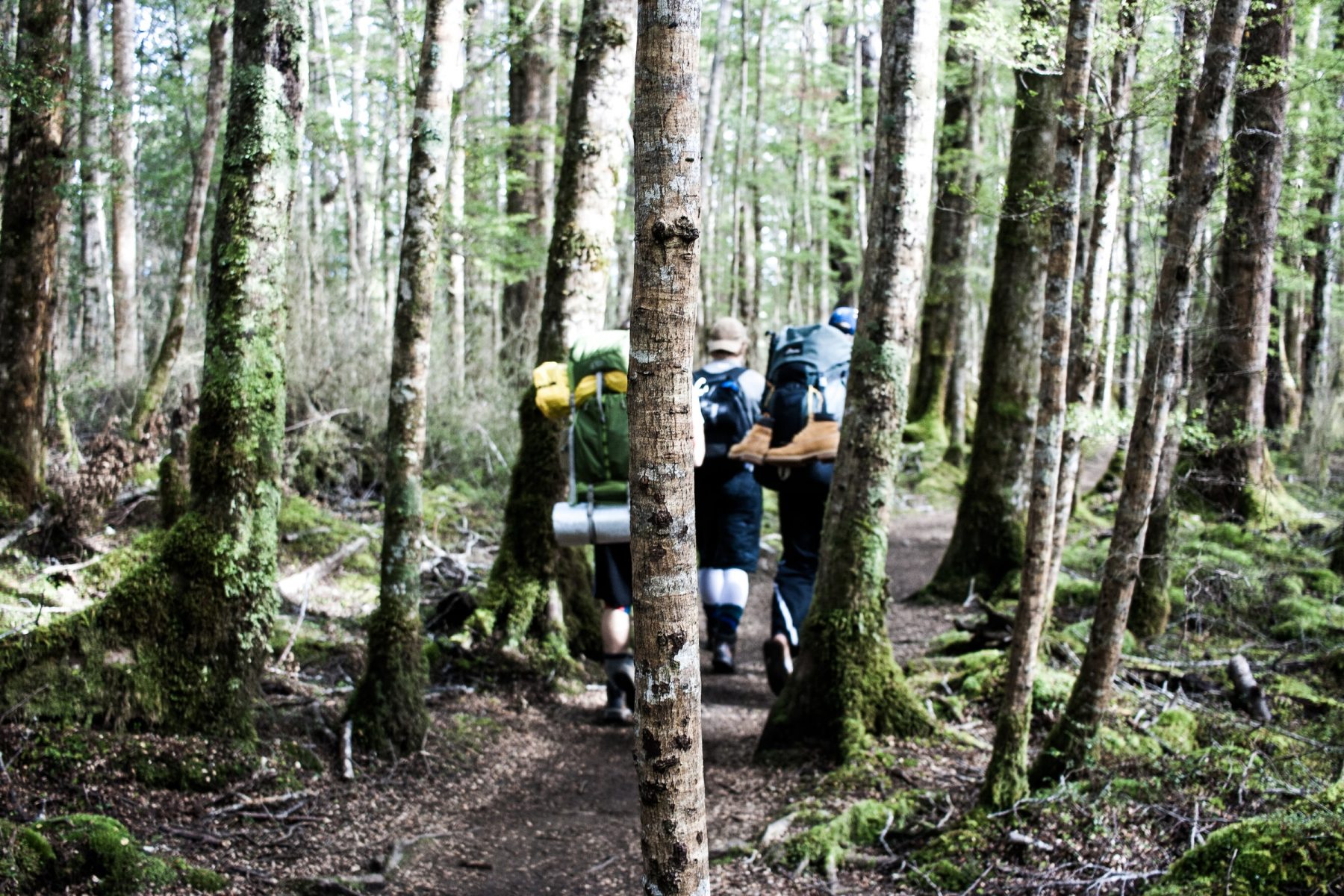Humans are drawn to nature. We are animals, after all. I believe in the restorative power of nature, and I believe in both recreational and educational access to natural environments. However, humans also have the capacity to damage vital ecosystems through this access, and we must be mindful of our impact on natural spaces. Leave No Trace is a set of environmentally ethical guidelines to help us be thoughtful on our environmental expeditions.
The Seven Principles of Leave No Trace are as follows:
— Plan ahead and prepare
— Travel and camp on durable surfaces
— Dispose of waste properly
— Leave what you find
— Minimize campfire impact
— Respect wildlife
— Be considerate of other visitors
I recently backpacked a section of the White Mountains in New Hampshire and found myself applying the Leave No Trace principles every step of the way.
Plan ahead and prepare.
My travel companion and I decided on our backpacking destination just a few days before our departure. We chose the White Mountains because we knew that their steep, rocky summits would provide us with a bit of a challenge, but nothing we couldn’t handle. Coming up with the idea was the easy part. As unglamorous as it was, logistics came next. We planned the route we wanted to take, opting for well-maintained trails and thus reducing our potential damage on the ecosystems. We then took on the packing process: We needed to ensure we had the optimal amounts of food, water, clothing and equipment.
Planning is a vital principle of Leave No Trace for several reasons. A manageable, navigable route is important to avoid situations that would call for some sort of rescue. The proper amounts of food and water provide hikers with fuel for the journey, and proper storage for the food eliminates the temptation to litter.
Travel and camp on durable surfaces.
Part of the fun of backpacking is coexisting with the environment that surrounds you. I felt nourished with every breath of alpine air. When I exhaled, I visualized the nearby trees soaking up the carbon dioxide of my breath, and I imagined that I, too, was a vital element of the ecosystem. While this connection is certainly what an expedition into the wild is all about, getting too carried away can be detrimental. Humans should not scamper through the underbrush or trek through bogs the way other animals would — we risk damaging the ecosystems with our clunky footsteps. So, we remained on the well-beaten path.
When the sun began to set, my friend and I headed to our chosen camping spot for the night: a backcountry campsite just a half mile off our trail. At the Perch, a site created and maintained by the Appalachian Mountain Club, we found ourselves still surrounded by pines and mere steps from the clear water of a miniature waterfall. However, the clearing was human-constructed and scattered with wooden tenting platforms. Obviously, the tenting platforms were convenient, but moreover, the designated space allowed us to sleep in the woods without damaging the ecosystem any further.
It is important to find a location that is already relatively clear of vegetation and potential animal homes when pitching a tent. If you pitch your tent atop any vegetation or fungi, you will likely kill the organisms. Every organism plays an important role in the ecosystem, and thus what feels like a harmless camping spot might offset the balance of an entire habitat.
Dispose of waste properly.
Inevitably, we bring the trash of the anthropocene with us into the woods. Granola bar wrappers, empty cans of beans, coffee grounds and orange peels all rank among the waste products that I would’ve rather not lugged along all weekend. However, there were no trash bins along the trail, as is typical for many hiking destinations, and throwing waste products into the woods has many detrimental effects.
Firstly, if you dispose of any food items anywhere near your sleeping area, you are likely to attract bears, rodents and vermin. Furthermore, littering in natural areas is harmful to the creatures who make the environs their home. Animals can choke on our wrappers or get sick from our food waste. Manufactured chemicals can mess with the microbes of the soil that give life to the entire ecosystem. So, my friend and I dutifully kept a plastic bag tied to the side of our backpack, stowing waste items as we walked.
Before settling in for the night, it’s usually advisable to keep any remaining food, wrappers, cooking utensils or anything else that might carry food residue as far from your tent as possible. Bears and other animals are super-sniffers, and the smell of food attracts them. We certainly didn’t want to become bear chow, so we sealed off our food waste, walked 100 yards from our tent and hung our backpacks on tree limbs.
Just as we hope to avoid bears, bears hope to avoid us. Bears are attracted to food smells, but encountering humans is scary. I should clarify. Humans are never at risk of being a bear’s meal, but a bear might be drawn to the food in or around your tent, only to be startled upon discovering you as well. Bears will attack humans only because they fear us — how ironic! To avoid a mutually unhappy run-in with a bear, follow Leave No Trace principles, and seal off your food.
Leave what you find.
Discovering unique fungi, colorful wildflowers and camouflaged frogs was my favorite part of the trip. At many points, I was tempted to pluck the bright red and purple mushrooms from their tree roots, just to get a closer look. I wanted to gather endless bouquets of orange and purple wildflowers to bring home. I fell momentarily in love with the gorgeous and delicate little frogs by the creeks and wished to pick one up and make it my pet. Remembering Leave No Trace principles, though, I resisted the urges to uproot these living things and instead marveled from a safe distance.
Removing living things, and even nonliving things, from an ecosystem offsets its balance. All fungi is vital in breaking down and decomposing the dead organic matter of the environment. The wildflowers that I was so tempted to pick are certainly important pollinators for the bees of the White Mountains. The frog is a living animal whose potential transplantation would be jarring and unhealthy. Furthermore, taking living things home means potentially bringing home diseases or the organic matter of an invasive species that could take hold around your house. Leave No Trace asks us to love the wildlife where it is meant to live.
Minimize campfire impact.
A fire is an essential ingredient of a great camping trip. Fires serve as a source of light for gathering and heat for cooking. However, human-made fires not properly contained or built in an extremely dry, at-risk location can quickly spread and destroy an entire niche. At our Perch campsite, my friend and I could not find an existing fire pit. We are not expert fire builders and thus opted not to create our own. Instead, we cooked our dinner on a gas stove with a contained flame and congregated around the light of a lantern.
If you do choose to build a fire, continue to follow Leave No Trace guidelines. Instead of cutting down living branches for firewood, gather already fallen sticks and twigs. Be sure to fully extinguish the flame before you go to sleep, dousing embers fully in water to truly Leave No Trace.
Respect wildlife.
Respecting wildlife is an important facet of Leave No Trace, and I often return to its key verb in my mind: respect. At the end of the day, it is most important not to disrupt, disturb or degrade any part of the landscape out of respect for the living things that reside there. Most other Leave No Trace principles boil down to this simple but astute sentiment. Consider the animals that hear loud human shrieking in their home. The animal might flee or attack out of fear. Also, feeding wildlife creates an unhealthy dependency between animals and humans. For this reason, we mustn’t disturb what is already a healthy ecosystem.
Be considerate of other visitors.
One of the best parts of a backpacking trip in my opinion is the interesting characters you meet along the way (this time from a safe distance).
On our hike, we encountered several other backpackers enjoying their own expeditions into the wild. We navigated a rocky summit thunderstorm with a family from Rhode Island, directed a father and son to a water source and shared a campsite with some college students from New Hampshire. Past 8 p.m. at our campsite, my friend and I spoke in whispers to avoid waking anyone who might be asleep. We gave and received tips on better trails and views.
It is important to be courteous to the people you encounter so that everyone can enjoy the great outdoors.

















